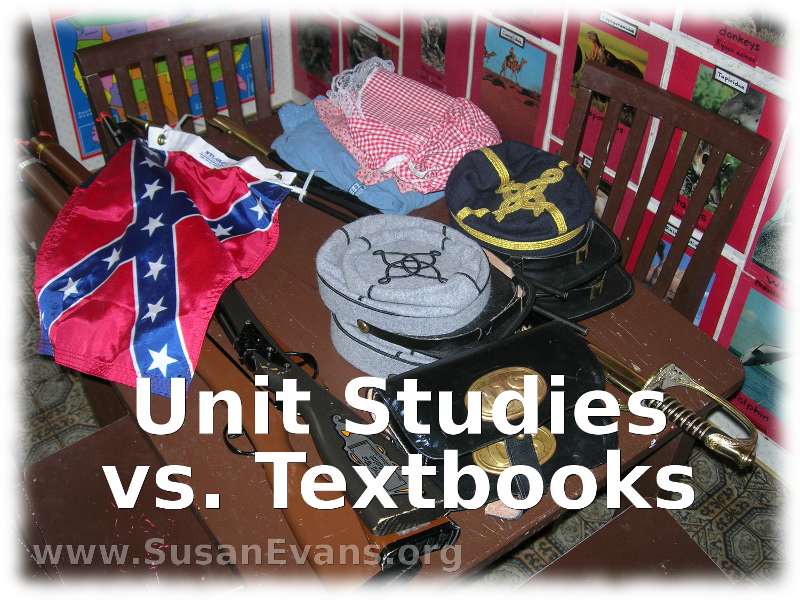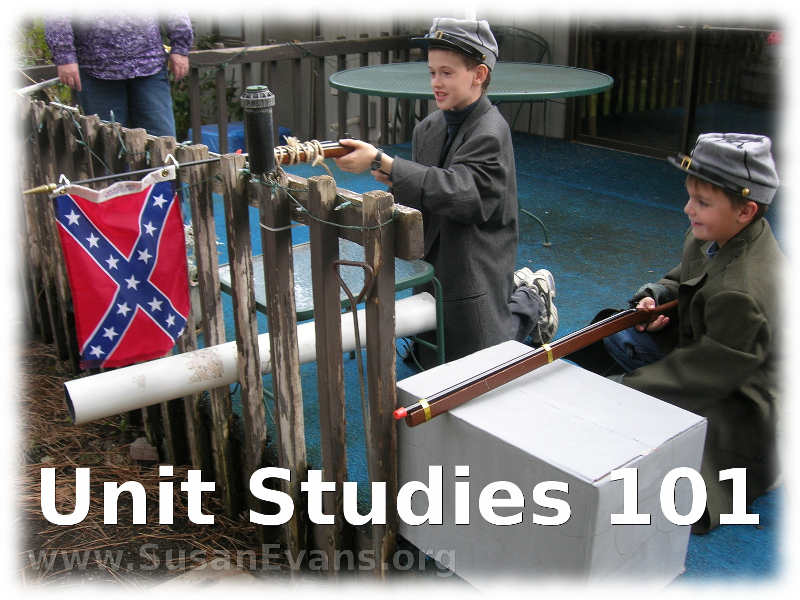 Today we will have a show-down: unit studies vs. textbooks. After reading this article, you will see the obvious fact that unit studies are superior in every way. I’m of course excluding math, which needs a proper program for progressing through skills with repetition. But there is no reason why a homeschooling family should need to use textbooks during the elementary years in any other subject. Here’s why:
Today we will have a show-down: unit studies vs. textbooks. After reading this article, you will see the obvious fact that unit studies are superior in every way. I’m of course excluding math, which needs a proper program for progressing through skills with repetition. But there is no reason why a homeschooling family should need to use textbooks during the elementary years in any other subject. Here’s why:
1. With unit studies, an expert who loves the topic is writing about it.
If you check books out of the library about a topic, those books are written by an expert who loves that topic. Not so with textbooks. With a textbook, an author writes about lots of topics in a superficial way, and you don’t feel their passion dripping off the page like you do with real books. When a person has spent years thinking about a topic and studying it, what they write will be completely different than a person who is churning out writing to fit into the grid of a textbook. When you interact with an author with a passion for birds, for example, you start understanding and loving birds more. Their passion spills off onto you, and learning is much easier.
2. With unit studies, you go more deeply into each topic instead of skimming the surface.
In a world of mass schooling where you don’t know what kids have learned in history and science from year to year, you have to hit all the topics, just in case they missed something the previous year. Mass schooling is like that. The teacher does not know what the student has previously taken in the content areas of elementary grades, because textbooks vary from school to school and state to state. There is one chapter on astronomy, for example, year after year. How much astronomy can you cover in one chapter? Wouldn’t it be better to do a whole year of astronomy, going in depth and actually learning the fascinating intricacies of our universe, and then you don’t need to cover it again, because it’s a part of who your children are? Do the same thing with each topic in science, taking a month, several months, or a year to splash into the topic until you have mastered it to some degree. Superficial learning is for people unfortunate enough to be in a mass schooling situation, not where we know exactly what our kids have learned because we taught it to them ourselves.
3. Textbooks are a failing system. Don’t imitate a failing system.
The school system is churning out half-illiterate kids. The textbook system that is being used is a failing system. There is no reason to be enslaved to a system that is a failure. Textbooks are notorious for being dry, and kids have to cram for a test and promptly forget the material. Not so with unit studies, which always have a “bring-it-to-life” component where you experience the topic. After interacting with the topic in tangible ways, the students find it easier to remember the subject they are studying.
4. You can accelerate your education through unit studies.
I will write a whole article about this tomorrow, but suffice it to say that you will finish all your sciences in-depth while relaxing at your own pace. You don’t have to spend bazillions of hours going through every tedious page of those heavy textbooks that cut off the circulation in your legs as you read them. You can do LESS and get AHEAD and retain more knowledge, having fun doing so. Imagine doing less work and having more energy to enjoy your learning so that it’s not at a frantic pace.
5. Textbooks chop everything into separate subjects that don’t inter-relate.
When you splinter your learning, chopping it up into bits during the day, it’s almost like a schizophrenic merry-go-round, where you are just checking off everything as it goes by in a blur. Why not step off the merry-go-round, delving into only one topic, and having all the learning revolve around that? After doing math in the morning, we spend a wonderful oasis of time splashing into ancient Greece, reading Greek mythology, re-enacting famous works with minimal props, writing fun skits to show the grandparents, and painting Greek pottery patterns on clay. The kids love it! They are living it, which is why they remember it. It’s alive, and you can allow your mind to dwell there for several hours a day instead of forcing your mind to focus on disconnected pieces.
6. With unit studies, you have less to do, and you’re smarter at the end.
You greatly simplify your life by doing unit studies. You don’t have to study something over and over and over superficially. Because you have studied each topic in greater detail, you have a greater amount of retained knowledge than you would have through textbook study. (The only exception to this is high school textbooks, which go much deeper into a topic. Elementary-aged school textbooks never go deep enough to give a child a fundamental grasp of each topic.)
7. With textbooks, each of your kids has a tall stack of books to do by themselves in the solitary confinement of their bedrooms.
With textbooks, the kids feel chained to their room, unable to get out until they have jumped through all the meaningless hoops dictated by committees that randomly decided what THEY wanted your child to learn. Don’t you want control over what your children learn? Don’t you want to decide? We as parents are not too stupid to make these decisions. As long as we cover all periods of history and all science topics at least once, it doesn’t matter how we do it. By the way, the schools don’t really teach much history any more, and almost no geography. Take matters into your own hands. Forge your own path.
8. Family unity is established through unit studies and not through textbooks. Create memories with your family.
When all the brothers and sisters are learning about the same topic on their own level, they have shared memories and can help each other learn the material. With field trips and hands-on learning, there will be more laughter and a feeling of togetherness. Older children can help younger children, and everyone benefits. The shared memories create a sense of family identity.
Come back tomorrow to see how you can accelerate your children’s education through unit studies.







